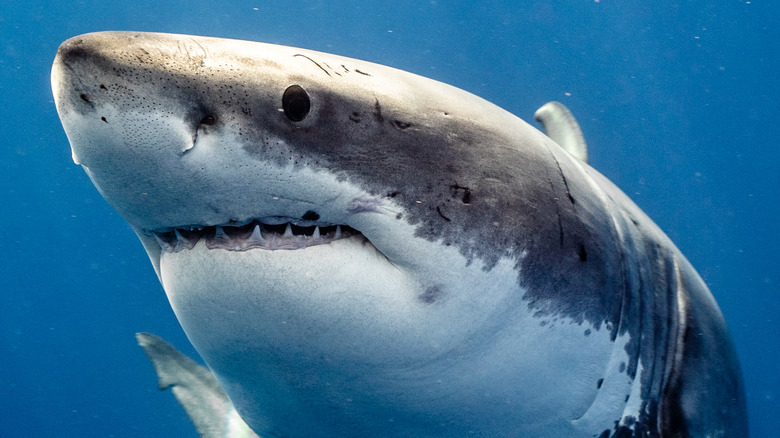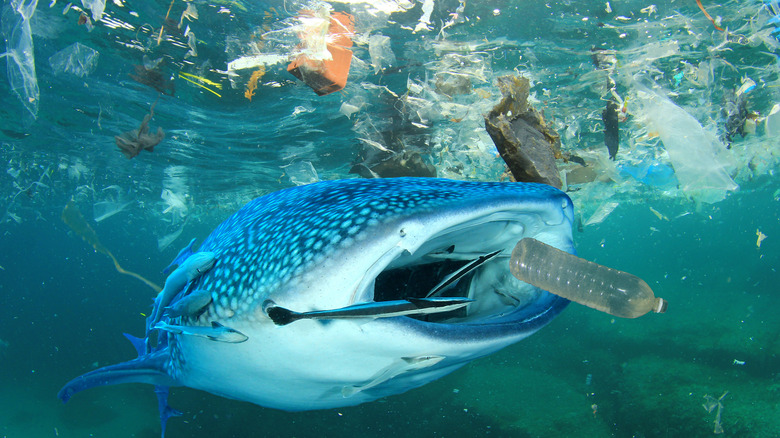The Interesting Reason Why Sharks Spit Out Their Entire Stomach
The 1975 horror film "Jaws" did a lot to scare people out of oceans and even more to create opinions regarding nature's most misunderstood fish. While sharks don't necessarily swim around making a day's work attacking and eating beachgoers, they do tend to eat a wide variety of things they shouldn't. Contents found in sharks' stomachs are often surprising and a sad reflection of human waste.
According to the ReefQuest Centre for Shark Research, everything from a chicken coop to unexploded munitions has been found in the stomachs of tiger sharks. However, tiger sharks are only making a meal out of what they see in their homes, whether edible or not. Thanks to humans, there's a lot in the ocean that sea life, sharks included, can't break down in their stomachs. Thankfully, sharks' bodies have a solution for this problem. When a shark eats something its stomach can't properly break down and digest, stomach eversion occurs.
Stomach eversion takes care of what shark stomachs can't break down
Stomach eversion is a shark's solution to a bad diet or accidentally eating something it shouldn't have. Stomach eversion is the process of regurgitating the entire stomach to rid it of any contents that stomach acid can't properly break down (per Awesome Ocean). Getting rid of any unwanted contents in their bodies is a voluntary solution that sharks can accomplish in less than one second by ejecting their stomach through their mouths and sucking it back into their bodies, leaving the troubling contents behind. One study performed on the Caribbean reef shark published by the Journal of the Marine Biological Association of the U.K. (posted at ResearchGate) recorded stomach eversions lasting as little as 0.28 seconds.
Not every shark species spits out its entire stomach for the same reasons. For example, the great white shark is known to spit up chunks of meat before eating more, possibly trying to consume only the meat that is of higher quality, according to Awesome Ocean. On the other hand, tiger sharks may consume a little of everything as long as they're able. One study, "Diet and Trophic Ecology of the Tiger Shark" (posted at PLOS One), monitored the contents of tiger sharks' stomachs from 1983 to 2014 and found that along with a wide variety of prey, these predators consume almost anything they can swallow.
Much of what sharks can't break down is human-generated trash
The stomach isn't the only organ that has been observed briefly exiting a shark's body. Sharks are able to empty their lower intestine through their cloaca, a "common chamber, and outlet into which the intestinal, urinary, and genital tracts open," according to Brittanica. The lower intestine version isn't as rapid as a stomach eversion, however, and this can lead to some problems for these undersea predators. A study presented by the Journal of Ethology noted that while intestinal eversion is less common for sharks outside of captivity, the longer time it takes to complete poses dangers for the shark, as smaller predators can target the out-of-body organ and its contents as their own bite to eat.
Stomach eversion is a natural occurrence in sharks and is a practical way for the animals to rid themselves of unwanted contents in their bodies. However, it may be possible to reduce the number of unwanted stomach contents in sea life by decreasing the amount of human trash they come across daily. According to Ocean Blue Project, microplastics are actually a more significant threat to marine life than larger pieces, and the amount of microplastics in the ocean only continues to rise. If you're ever a witness to a shark performing stomach eversion, just know that they're just trying to avoid a rather painful stomachache.


